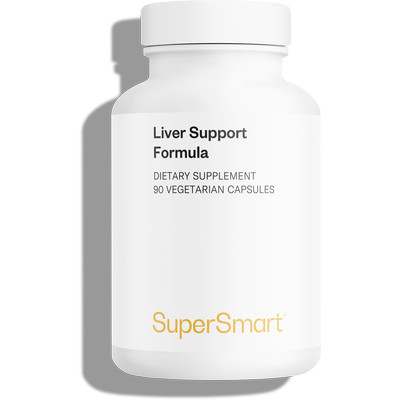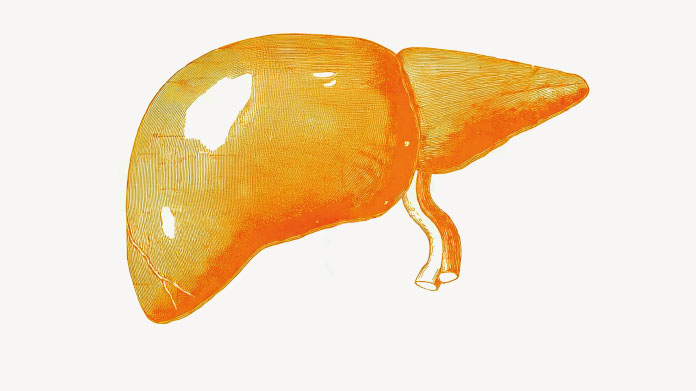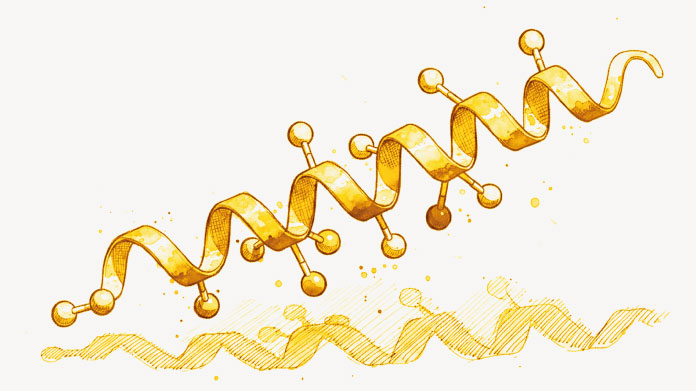Protein diet to reduce an enlarged liver: does it really work?
A new ‘detox’ diet has recently emerged: a high-protein diet to reduce an enlarged liver. But does it really work? What are the risks of such an approach? And are there any alternatives for achieving the same end?

Enlarged liver: warning, danger
Hepatomegaly: symptoms
The term hepatomegaly means enlargement of the liver. The body’s biggest internal organ, the liver is made up several lobes and can thus expand in a homogeneous or heterogeneous way. In either case, hepatomegaly normally manifests in various symptoms:
- discomfort in the abdomen and sometimes bloating;
- sensitivity of the organ to touch;
- dark-coloured urine;
- nausea;
- weight loss and lack of appetite;
Hepatomegaly: causes
Hepatomegaly can have a number of causes: hepatic steatosis (fatty liver) (alcoholic or non-alcoholic), liver inflammation (viral, drug-induced or non- viral), a tumour in the liver, heart failure, a disease of the immune system, excess iron, etc. (1)
That’s why in all cases of hepatomegaly, it’s important to consult a doctor so that further investigations can be carried out and an accurate diagnosis made.
A protein diet to reduce an enlarged liver
Protein diet, the liver and weight loss
One cause of hepatomegaly is non-alcoholic fatty liver disease (NAFLD) related to metabolic syndrome. Here, fatty liver disease is caused by excess weight or obesity, in a similar way to the geese force-fed to produce the famous foie gras of south-west France.
In this context, a a diet aimed at weight loss is one of the first recommendations for reducing an enlarged liver (2).
And a high-protein diet can, to some extent, be the right approach for achieving weight loss (though it’s not without risk, as we’ll see later). A diet such as this allows you to consume a relatively large amount of food (animal protein) with a low calorie density, satisfying your hunger without ingesting too many calories.
Generally speaking, however, what causes so many problems for liver health is an unhealthy diet high in saturated fats and simple sugars, coupled with a sedentary lifestyle. Thus a balanced diet containing healthy fats, pulses and wholegrains, lean protein, and plenty of fresh fruit and vegetables, is still the best solution (3).
Protein diet for reducing an enlarged liver: dangers
This is because, as mentioned, high-protein diets are not without risk. For some years now, health authorities have been warning about the risks this type of diet poses to the kidneys: too much protein in the diet can, for example, lead to hypercalciuria (excess excretion of calcium in the urine due to continuous filtering of the blood to eliminate protein breakdown products).
In fact, protein upsets the body’s acid-base balance by making it more acid. You therefore need to take great care to ensure you eat large amounts of fresh fruit and vegetables and to stay well-hydrated to prevent protein-related kidney damage.
What’s more, a high-protein diet has been shown in other studies to lead to increases in liver triglycerides and markers of alcoholic fatty liver disease.
The reason for this is quite simply the liver’s key role in protein metabolism. Once protein from food has been broken down into amino acids in the gut, the liver uses these amino acids to make protein for the body.
Any excess amino acids can then be directed towards the muscles or converted into urea and excreted in urine. In addition, some protein is converted during digestion into ammonia, a toxin which needs to be detoxified by the liver (4).
And that’s where the problem lies: over-consumption of protein means the liver has to work hard to process a an excessive amount of ammonia, which causes inflammation.
So we can see that a protein diet is not such a great idea for reducing an enlarged liver!
Answers to your liver detox questions
Worst foods for the liver
The liver plays a key role in metabolising fats and sugars. Certain foods can therefore aggravate liver problems and should be avoided. These include foods high in saturated fats and added sugars, such as fried foods, ready-meals and sugary drinks.
3-day natural liver-cleanse
There are a number of methods which it’s claimed can cleanse the liver in just a few days. But it’s important to understand that the liver is a complex organ which takes time to regenerate. Three-day diets or liver-cleansing methods can thus be ineffective and even dangerous.
How long does it take to detox the liver?
The amount of time needed to cleanse the liver depends on the severity of the problem and the organ’s ability to regenerate. It’s best to consult a health professional who can assess the condition of your liver and provide personalised advice.
Natural liver detox
You can support the health of your liver by adopting a healthy lifestyle. This means eating a balanced diet, with plenty of fruit, vegetables and wholegrains, and staying well-hydrated. In addition, certain foods such as garlic (5), turmeric (6) and grapefruit are considered beneficial for liver health.
Cleansing the liver: risks
It should be noted that some liver-cleansing methods, including extreme diets or the use of detox products without medical supervision, can put your health at risk. It’s important to seek safe options only and to consult a health professional before undergoing any kind of liver detox.
Pharmacy drugs for cleansing the liver
There is no specific medication available at pharmacies for cleansing the liver. Certain drugs may be prescribed for specific liver conditions but they must be taken under medical supervision and should not be used for the purpose of detoxing the liver.
How to clear fat from the liver naturally
To eliminate fat from the liver naturally, you need to take a holistic approach. This involves changing your diet to reduce your intake of saturated fat and added sugars, and increasing your level of regular exercise. Gradual, sustained weight loss can help to reduce accumulated fat in the liver.
Liver dysfunction and weight gain
It’s important to note that liver problems can lead to weight gain and make it difficult to lose weight. Liver dysfunction can upset the metabolism of fats and carbohydrates, which can result in weight gain.
Side-effects of a liver detox
Some people may experience side-effects when they undertake a liver detox, including headaches, fatigue, nausea and changes in bowel habits. If you experience persistent or serious side-effects, you should seek advice from a health professional.
Natural and traditional home remedies for the liver
As is so often the case, ‘grandma knows best’ is a useful principle to apply when it comes to caring for the liver naturally.
Traditional home remedies include:
Artichoke
This contains cynarin, a polyphenolic compound of caffeic and quinic acids, which supports good digestion and liver function by stimulating the production of bile. Indeed, artichoke has long been used in the form of infusions for treating digestive disorders (7).
Milk thistle
Known botanically as Silybum marianum, milk thistle contains silymarin, a powerful group of flavonoids now used as a phytotherapeutic treatment for liver problems and dyspepsia. Silymarin is also a potent blend of antioxidants widely-studied for its potential anti-inflammatory and anti-cancer properties (8).
Picrorhiza Kurroa
Here, we’re looking less to our grandmas and more to the East with the inspiration provided by Ayurvedic medicine. A medicinal plant native to the Himalayas, picrorhiza kurroa also helps to support healthy liver function (9).
Chlorella
A single-celled algae, chlorella is found in many freshwater locations across the world and was identified at the end of the 19th century by a Dutch botanist. With a high content of healthy fats, protein, chlorophyll, vitamins, minerals and specific pigments, chlorella also supports liver health (10).
For an effective detox then, the best approach is to eat a healthy, balanced diet, stay well-hydrated and perhaps support the health of your liver by drinking herbal teas made from traditional medicinal plants or taking dietary supplements that contain these plants’ active ingredients (such as Liver Support Formula).
SUPERSMART ADVICE
References
- KAUDE, Jüri V. et DELAND, Frank. Hepatomegaly. Medical Clinics of North America, 1975, vol. 59, no 1, p. 145-167.
- DUNN, Winston et SCHWIMMER, Jeffrey B. The obesity epidemic and nonalcoholic fatty liver disease in children. Current gastroenterology reports, 2008, vol. 10, no 1, p. 67-72.
- TOSHIMITSU, Kumiko, MATSUURA, Bunzo, OHKUBO, Ikuko, et al.Dietary habits and nutrient intake in non-alcoholic steatohepatitis. Nutrition, 2007, vol. 23, no 1, p. 46-52.
- https://www.liver.ca/wp-content/uploads/2020/10/Foie-et-alimentation.pdf
- GUAN, Min-Jie, ZHAO, Ning, XIE, Ke-Qin, et al.Hepatoprotective effects of garlic against ethanol-induced liver injury: A mini-review. Food and Chemical Toxicology, 2018, vol. 111, p. 467-473.
- TUNG, Bui Thanh, NHAM, Dong Thi, HAI, Nguyen Thanh, et al.Curcuma longa, the polyphenolic curcumin compound and pharmacological effects on liver. Dietary Interventions in Liver Disease, 2019, p. 125-134.
- KRAFT, K. Artichoke leaf extract—recent findings reflecting effects on lipid metabolism, liver and gastrointestinal tracts. Phytomedicine, 1997, vol. 4, no 4, p. 369-378.
- FLORA, Kenneth, HAHN, Martin, ROSEN, Hugo, et al.Milk thistle (Silybum marianum) for the therapy of liver disease. The American journal of gastroenterology, 1998, vol. 93, no 2, p. 139-143.
- SHETTY, Sapna N., MENGI, Sushma, VAIDYA, Rama, et al.A study of standardized extracts of Picrorhiza kurroa Royle ex Benth in experimental nonalcoholic fatty liver disease. Journal of Ayurveda and integrative medicine, 2010, vol. 1, no 3, p. 203.
- PANAHI, Yunes, GHAMARCHEHREH, Mohammad Ebrahim, BEIRAGHDAR, Fatemeh, et al.Investigation of the effects of Chlorella vulgaris supplementation in patients with non-alcoholic fatty liver disease: a randomized clinical trial. Hepato-gastroenterology, 2012, vol. 59, no 119, p. 2099-2103.
Keywords
9 Hours
Good delivery and flawless quality
AS far as delivery and the visual quality are concerned, Supersmart is excellent. I will not comment on the efficacy of the products themselves, since that is only possible over a longer period and in a large customer base compared to people who do not consume a particular product.
Roger De Backer
1 Days
Perfect services
Perfect services, perfect support, great articles about products
Michaela Alali Beitlová
2 Days
Great experience and effective supplements
I’ve purchased many types of supplements from this company over the course of years to treat a few issues, and I’m satisfied with their quality. After using them consistently for a period of time, I can say they met my expectations and I could feel real health benefits that built up over time. Deliveries are always quick. I recommend this company to anyone looking for high-quality supplements.
Giordano
2 Days
Es hat alles gestimmt
Es hat alles gestimmt. Top
marina thieme
5 Days
Great product
Great product, but still evaluating its effectiveness. Highly recommended. Super efficient delivery.
Chalise
9 Days
Quality products
Quality products , efficient and effective customer service. You can’t ask more
CLaudia
15 Days
Good quality product and customer service.
So far, I'm liking this product, and the customer service was very good.
ELZL
22 Days
The products I use are excel·lent
The products I use are excel·lent
ROSAS Josep Maria
30 Days
Delivery is prompt and I never saw a…
Delivery is prompt and I never saw a quality problem with the manufacturing. It is not possible to assess efficacy on a personal basis, since too many factors come into play. Efficacy can only be assessed statistically with a sufficient number of cases.
Roger De Backer
31 Days
I collaborates with the Supersmart…
I collaborates with the Supersmart more than 10 years. Every thing is going good. Quality of the things is good. Delivery comes in time. Five stars definitely !!!
Oleksiy
31 Days
All good
Simple, frictionless site, easy ordering, good delivery updates and execution.
Chris Robbins
33 Days
I feel better
I feel better
Peter Ammann
33 Days
Prompt delivery
Prompt delivery
JAKUB Radisch
34 Days
My new go-to for top quality supplements!
I am buying more and more of my supplements from this superb, high quality company. Cannot recommend it enough. Plus, excellent customer service with a quick, helpful team and speedy deliveries. Highly recommend Supersmart!
Cecilie H.
38 Days
SUPERSMART WHAT ELSE👍
SUPERSMART WHAT ELSE👍
DIEDERLE Christophe
of experience
your money back
##montant## purchase




